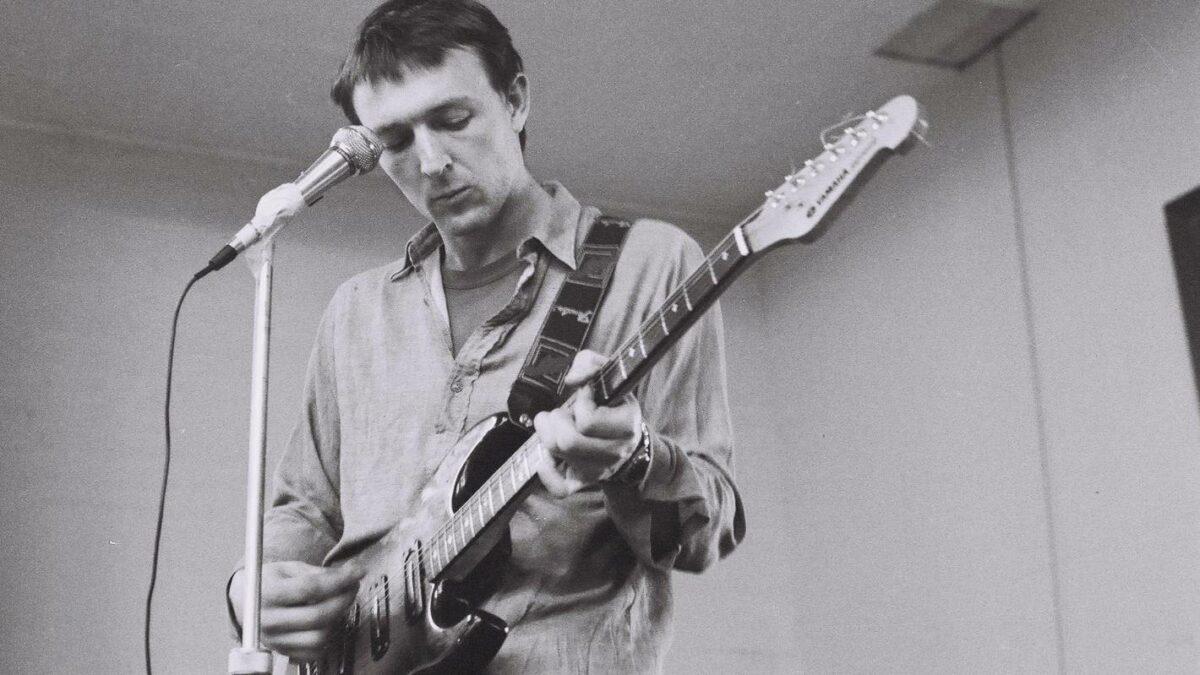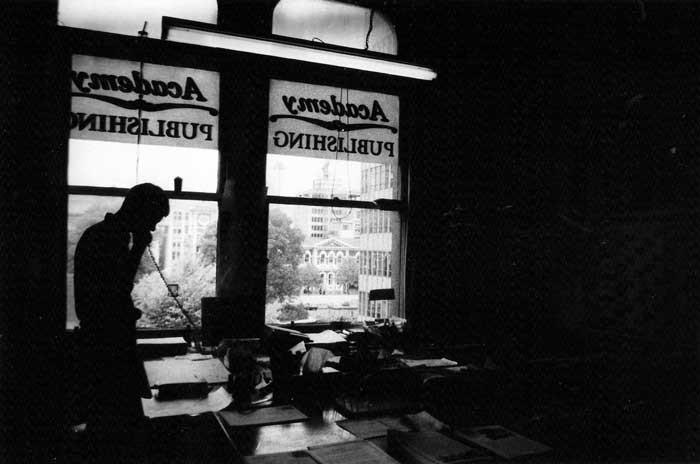
“Growing in the Shade”: Bill Direen, Christchurch, and the Beginnings of Flying Nun Records
It is certainly not possible to discuss the entire history of Flying Nun Records in one blog post. This fact is proven by Audioculture, the New Zealand music website which has pages and pages of articles dedicated to the legendary indie label. This past month, I was inspired by Brian McCabe’s Radio Topo tape, ‘God’s Own Country,’ to explore some of the essentials of kiwi rock for the blog, to reflect on the indie rock staples from New Zealand’s past.
However, my focus shifted when the Louisville-based label Sophomore Lounge recently reissued Bill Direen’s second LP, Split Seconds, following the 2016 Grapefruit Records reissue of his first album. Direen’s decades-long career spans music, poetry, and theatre, an eclectic life releasing creative work under various names and projects. In 1983, Direen’s debut album secured the honor of being the first full-length album released by Flying Nun, with Split Seconds out the following year. So, in order to narrow the scope a bit from my craving to cover all of New Zealand’s rock history, this month’s blog will look at the early history of Flying Nun tied in with Bill Direen’s early musical career.
Despite the fact that Flying Nun was originally based in Christchurch, it is often associated with the Dunedin sound, a style of indie rock from the New Zealand city that was characterized by resonating and jangly guitars, along with influences from punk and sixties psychedelic rock. Similar influences proliferated in Christchurch in the sixties and seventies. Initially, young musicians in the sixties were drawn to American R&B, but by the mid-seventies, the hippie culture made way for a new, emerging underground style, which Audioculture’s Andrew Schmidt described as a “patchwork crowd of young punks, counterculture survivors and Garden City oddballs.” The first punk club, Mollet Street, opened in 1977 and 1978, carving out a space for a new era in Christchurch’s music scene.
Before showing up at Mollet Street, one of the first clubs Bill Direen performed at was the Christchurch Folk Club. Growing up surrounded by music and poetry in his family, Direen started off performing folk and blues, both American and British, in solo acoustic sets. He gradually infused his repertoire of traditional folk tunes with his own compositions. His first recorded original song was an advertisement for Superwheat bread in 1975, which caught the attention of local musician, Peter Stapleton. Upon meeting Stapleton and Stapleton’s friend Steve Cogle in 1976, the trio formed Direen’s first band, Vacuum. The band was heavily inspired by psychedelic pop and the Velvet Underground, bringing them to Mollett Street and into the fore of the burgeoning punk scene in Christchurch.
Part of Christchurch’s shift towards a punk scene was spurred by Olly Scott, a musician who moved to the city and brought with him a love for the early punk sounds of bands such as the Stooges. He was an integral member of the Detroit Hemroids (later the Basket Cases), which birthed members of essential New Zealand bands to come, such as The Bats, The Gordons, and Toy Love. In a way, the Detroit Hemroids also birthed Flying Nun Records.

In the mid-seventies, Flying Nun founder Roger Shepherd got off work from The Record Factory and attended a Detroit Hemroids show at The Gresham venue, giving him his “first real experience of live music played in a confined space and the sense of excitement that could be generated.” His desire to get involved with the local art scene he interacted with on a daily basis eventually inspired him to start a record label to capture the unique sounds coming out of Christchurch, and eventually Dunedin as well. By 1980, the scene in Christchurch was thriving, with many participants involved in intersecting creative interests, including music, art, and poetry.
Pursuing various creative avenues was definitely Bill Direen’s number, whose endeavors spanned from writing to theatre. In the years leading up to his first full-length album, he was exploring electronic music as well, studying with Douglas Lilburn. He developed a fascination with tape music and the sounds of daily life, such as “cicada-song.” Direen’s musical projects were often changing identity too, with Vacuum morphing into Victor Dimisich Band, and then into Builders (one of many band names that played on Direen’s name). Direen has said that lack of money and promotion often led to the quick dissolutions of the bands, but reflected that, “I was always pretty useless at that, but perhaps I like to grow in the shade like ferns and some plants.”
Prior to releasing Direen’s first LP as Builders, Flying Nun put out a couple crucial singles in the early eighties, The Pin Group’s “Ambivalence” and The Clean’s “Tally Ho!.” Direen first put out an EP on Flying Nun with Malcolm Grant and Allen Meek, titled Schwimmen In Der See in 1982. Builders’ Beatin Hearts followed the next year, the label’s first full-length. The album returns to some of Direen’s earlier songs, such as “Dirty and Disgusting” and “Alien.” Beatin Hearts is ultimately a lithe record, a lean combination of guitar, bass, drums, and occasional organ delivering a spry collection of lo-fi indie tracks that pay attention to the little details, like the eerie, high-pitched organ on “Alien.” It is an emblem of clever songwriting and constant musical interest that set the template for many bands to come.
Direen released his second album the following year, titled Split Seconds and put out under the name Bilderine. The instrumentation gets a little thicker at moments on Split Seconds, although the nimble guitar essence of Beatin Hearts remains. Tracks like “(Just Like) All the Rest” propel forwards with a jittery drive, while the plaintive “Girl at Night” settles into a gentle, slightly downtrodden pattern. And to the excitement of Vacuum fans, Peter Stapleton and Steve Cogle recorded the band’s lost track, “Retail Trade.” The sound on Split Seconds is as eclectic as Direen, but also distinctly his own.
Bill Direen’s expansive career continued on from this point of course, and Flying Nun would go on to release hundreds of albums and singles that shaped indie rock history for all of us. And for the both of them, it’s still ongoing. But for the time being, I have to end the story there. Maybe one day I’ll return to Direen or Flying Nun here, but in the meantime, grab the first-ever vinyl reissue of Split Seconds from Sophomore Lounge and check out Brian McCabe’s NZ mixtape.
In the Shop
Bilderine – Split Seconds – $23
God’s Own Country : A NZ Mixtape – Radio Topo #16 – $8
More NZ indie rock
The Bats – Foothills LP – $16
The Chills – Pyramid – $19
The Chills – Soft Bomb – $40
The Chills – Submarine Bells – $40
The Clean – Boodle Boodle Boodle (White & Black Swirl Vinyl) – $19
Resources
Russell Brown, “A Flying Nun Pre-History,” Audioculture (2015)
“Flying Nun Records,” National Library of New Zealand
Sean L. Maloney, “Bill Direen Keeps Learning About Himself Through Others,” Nashville Scene (2019)
Andrew Schmidt, “Bilders Collectives,” Audioculture (2013)
Andrew Schmidt, “Bill Direen Part 1 – A Maverick Voice 1975 to 1984,” Audioculture (2014)
Andrew Schmidt, “Mollett Street Madness – Christchurch Punk,” Audioculture (2014)
Roger Shepherd, “Guest Blog: Roger Shepherd of Flying Nun,” Stuff (2009)
– Hannah Blanchette
April 30, 2023 | Blog